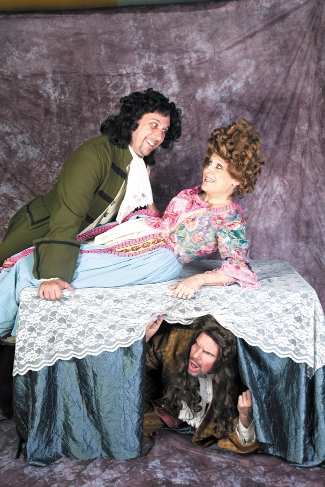Tartuffe Hits The Classic Spot
Tartuffe. It’s French, it’s a classic, it’s by the great Jean-Baptiste Poquelin and the word does come off sounding rather onomatopoetic. Haven’t heard of Poquelin? Perhaps you’ll recognize the playwright’s stage name, the great Molière. In time, Tartuffe has become one of the most-celebrated comedies of Western theatre. A few hundred years after the play was written, it’s still relevant, and the footsteps of the titular fraudster will be making their way across HPU’s Paul & Vi Loo Theatre.
mw-art-111313-tartuffe-1
Tartuffe. It has the ring of someone a bit bloated with self-importance and has, in fact, come to denote a hypocrite or sanctimonious person. Hawaii’s own Rob Duval is the bloated fellow, a vagrant who, with the airs of religious authority, manages to pull the wool over the eyes of an aristocratic young man (David Starr as Orgon) and his mother (Lynn Weir as Madame Pernelle). The thing is, the rest of the family and servants see the scam artist for the rogue he is.
When the play was first performed in 1664, King Louis XIV was amused, but his archbishop was not and the work quickly was censored. Nevertheless, word had already spread and, as censored things are wont to do, its underground popularity only increased, making it, by some accounts, the most commonly produced play in the French language. Today – creatively contoured wigs, frilly long dresses and all – it is being directed at HPU by Joyce Maltby.
“I do two shows a year, and I don’t have a play reading committee,” says Maltby of her process for choosing plays. “I read tons of plays, and there’s always something wrong with each one. I like to do shows that have possible roles for students. I like to do something worthy of the university. I like to do classics. But I also want to draw an audience in.
So, I went to one of my favorites and that’s Molière, and one of Molière’s greatest plays – and that’s Tartuffe. It had all the things I needed,” concluded Maltby, who was game for answering a few more questions:
Q: Will audiences relate, or are the language and concepts a bit lofty and classical?
A: Among the versions I read, this one is not too lofty or classic for a general audience. No matter the translation, the basic story and concepts are easily understood and enjoyed by audiences. I directly connected to the version we’re using, and I thought it was maybe a little more colloquial than some of the others. It’s certainly not as difficult to get, as a lot of Shakespeare is. With Molière, it’s being translated into English, and by modern writers who are giving it an English that is more understandable and accessible to audiences.
Q: Did you choose this version because it’s more colloquial?
A: I don’t think so. I read five complete versions. One was in blank verse, one in iambic pentameter, one in prose and a couple in rhymed couplets. I finally thought this one challenged me, and it was recently done by the Oregon Shakespeare Festival. I thought, hey, if it’s good enough for the Oregon Shakespeare Festival, it’s good enough for us.
Q: What was the social climate in which it was written, and is there a “message”?
A: Maybe that hypocrisy often rules and so easily can affect the political and social atmosphere of the time – often with disastrous outcomes. Of course, not with the comic extremes we find in this play, but good “actors” in real life can so easily sway people to their side. Beware!
Q: What about Tartuffe will attract audiences today?
A: It’s funny and a classic, and as with the great classics, it’s timeless.
Q: Who are the most fascinating characters?
A: Well, Tartuffe and Orgon. One who can so easily sway, and the other so incredibly gullible, but it’s the relationship that makes them so interesting and so much fun.
Q: What can audiences expect?
A: I hope a story well told, many laughs and a glimpse at a time, though exaggerated, very different from the present day.
Q: Anything you’d like to add?
A: The genius of Molière was not only that he was a wonderful playwright, but that as with all great writers, they are ahead of their times. He goes beyond the hypocrisy of the character of Tartuffe to comment on how many people in his time – and throughout time – in their sheer will to believe, condemn the natural human condition as corrupt. Molière demands respect for his ideas, and they place him as a visionary and the play well onto the path of the Enlightenment … The Age of Reason.
the TICKET stub
TARTUFFE
When: Wednesday-Sunday, Nov. 15-Dec. 8
Where: Hawaii Pacific University, Paul & Vi Loo Theatre
Cost: $5-$20
More Info: 375-1282, hpu.edu/theatre






